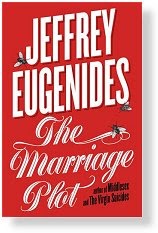


And now, just as surprisingly, he’s produced a romantic comedy wrapped around an academic satire that looks like the sprightly love child of Allegra Goodman and Jonathan Franzen. That carefully crafted novel had little in common with the voracious vision of “ Middlesex” (2002), a story of cultural and sexual conflation that won the Pulitzer Prize. His cool and creepy debut, “ The Virgin Suicides” (1993), captured the collective voice of a neighborhood of boys who pine for the self-destructive Lisbon sisters. In 20 years, he has published just enough novels to form a triangle.

For hundreds of years, literate people have drawn their impressions of sexual and social intercourse from plots about marriage, and now this sophisticated modern writer has produced a novel of his own about the persistence of “the marriage plot” in an unromantic world.Įugenides is a nobly unprolific author for such a successful writer, which makes his body of work difficult to categorize. No less a pioneer of domestic fiction than Flaubert was hauled into court for his misleading portrait of an adulterer in “ Madame Bovary.” And recall that Jane Austen, the grandmother of romantic comedy, wrote her first book, “ Northanger Abbey,” about a young lady whose sensibilities were wildly distorted by reading too many gothic novels.Įugenides’s love affair with fiction embraces all those contradictions: the novel’s potential to confuse and enlighten, to teach what love is really like even while confusing us with impossible ideals. Thomas Jefferson warned that novel reading causes “a bloated imagination, sickly judgment, and disgust towards all the real businesses of life” (which didn’t stop him from carrying on some novel-worthy business with Sally Hemings). Or misread them.įor a long time now, we’ve been anxious about novels’ potential to delude us - or usually others. Jeffrey Eugenides’s new novel, “ The Marriage Plot,” starts down the aisle sparkling with humor like a modern version of “ Pride and Prejudice,” but before reaching the altar, it veers into the romantic disappointments of “ The Portrait of a Lady” and finally descends perilously close to “ Ethan Frome.” Which is to say, this is a story about romance and novels - and the bright young people who read them.


 0 kommentar(er)
0 kommentar(er)
